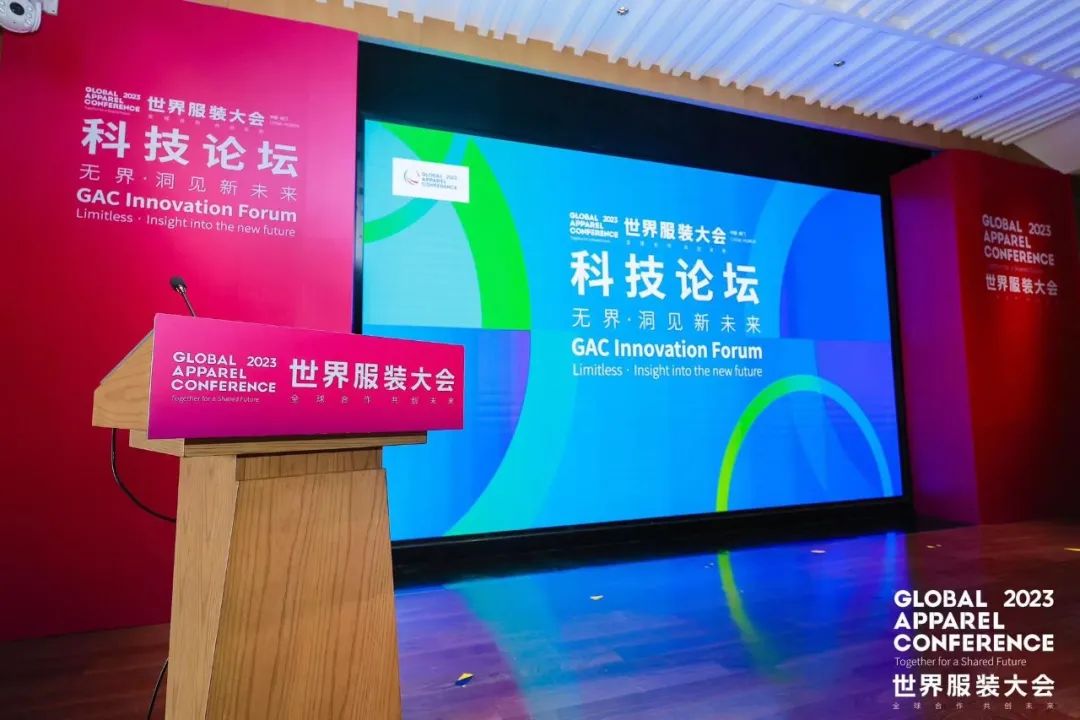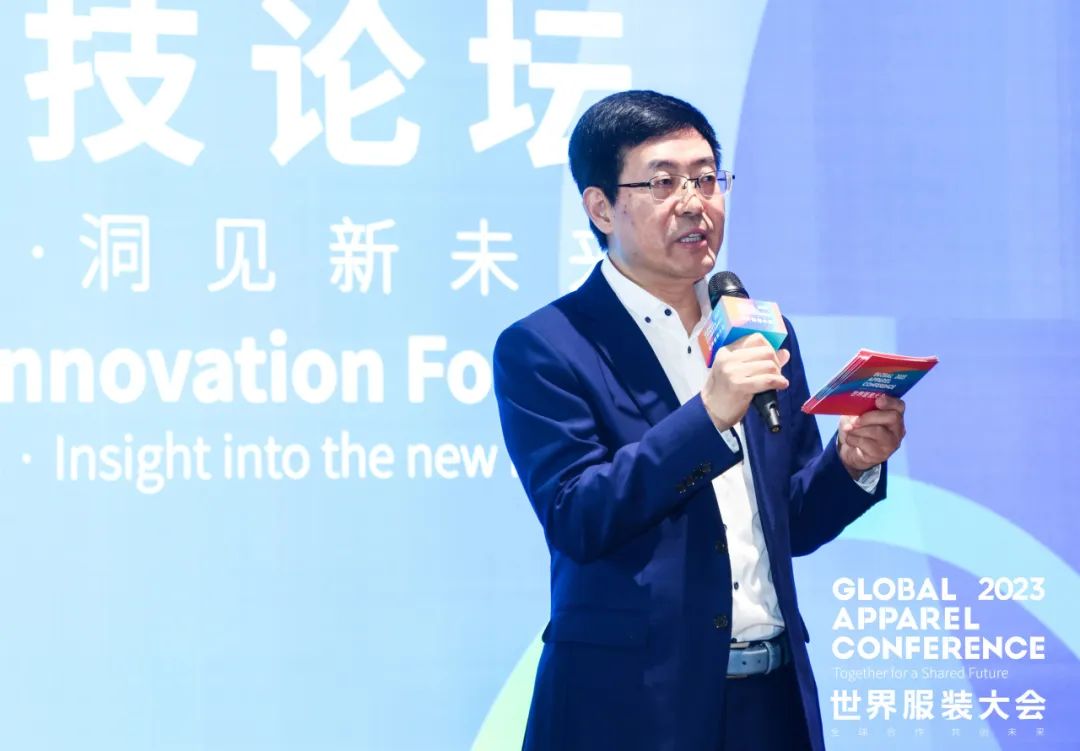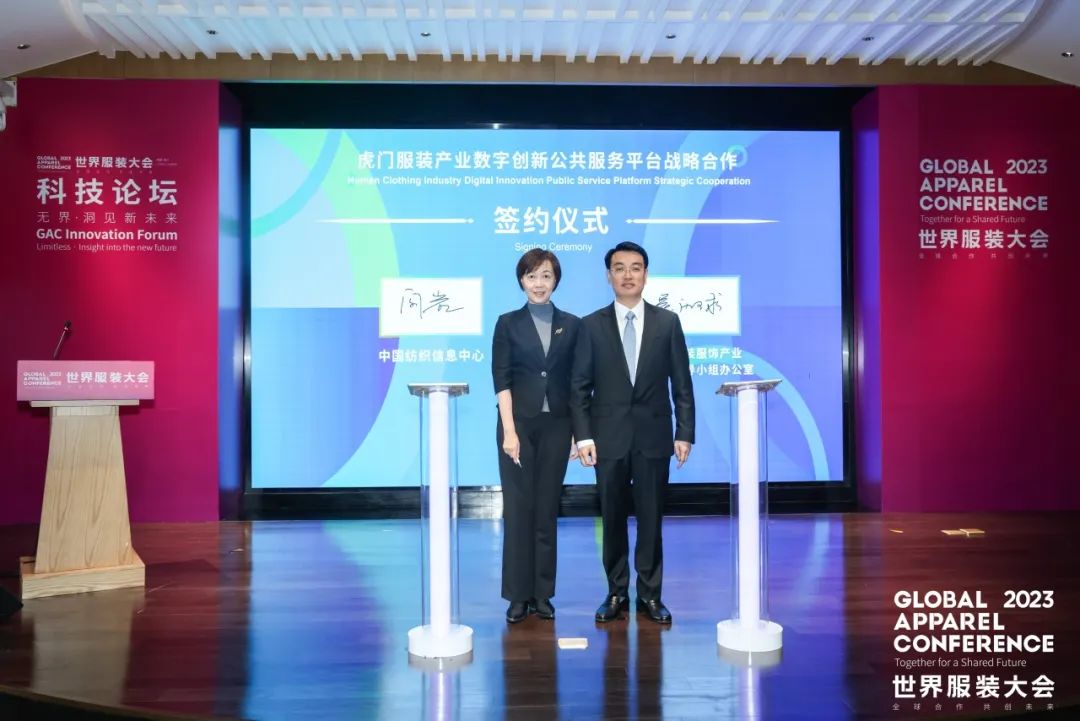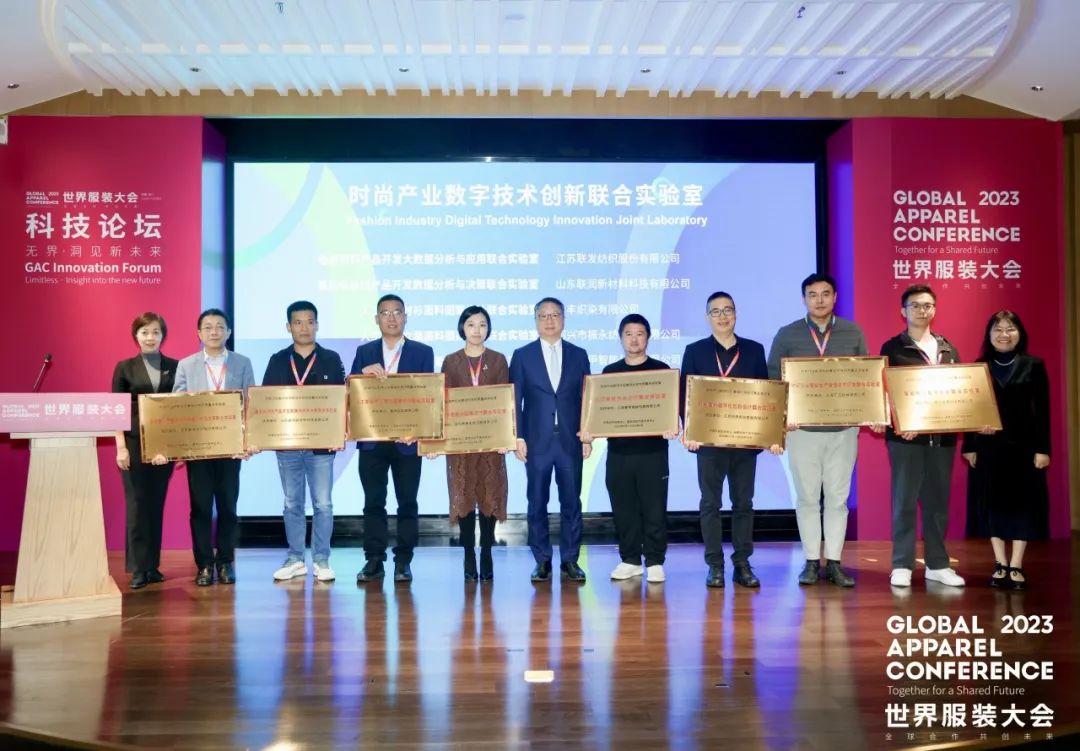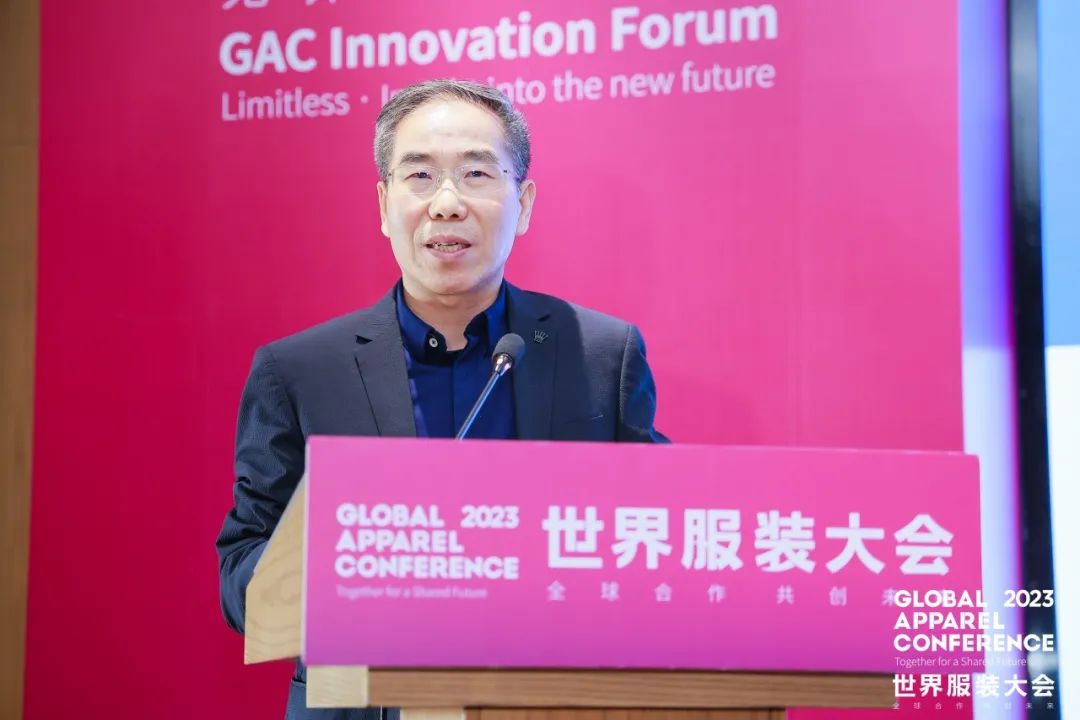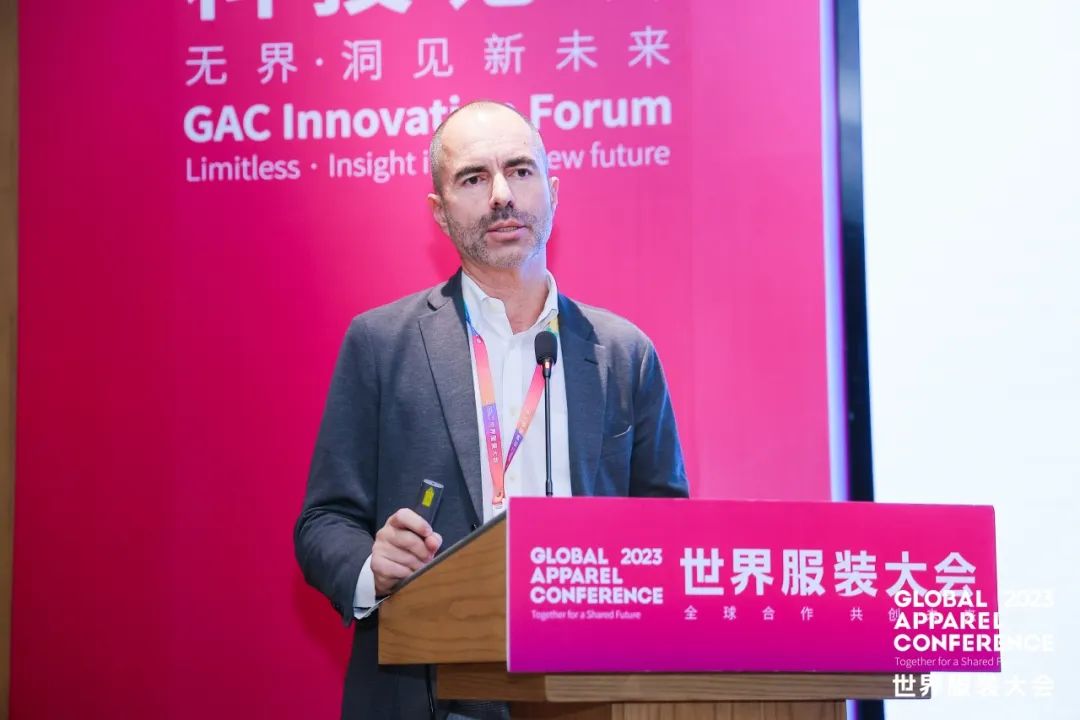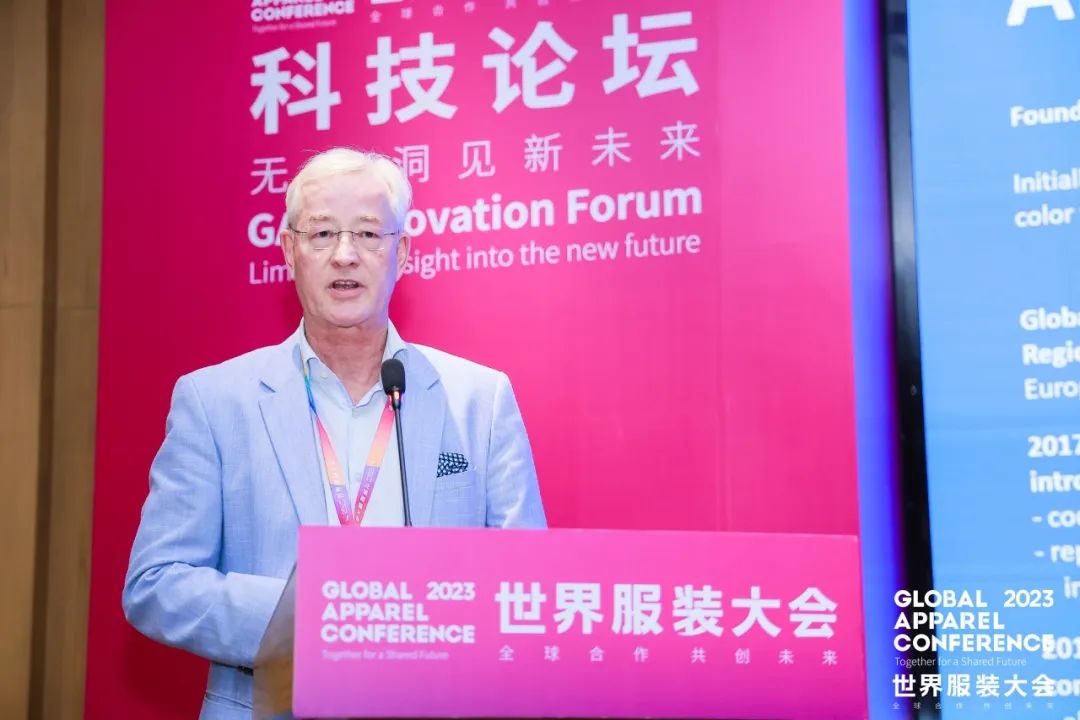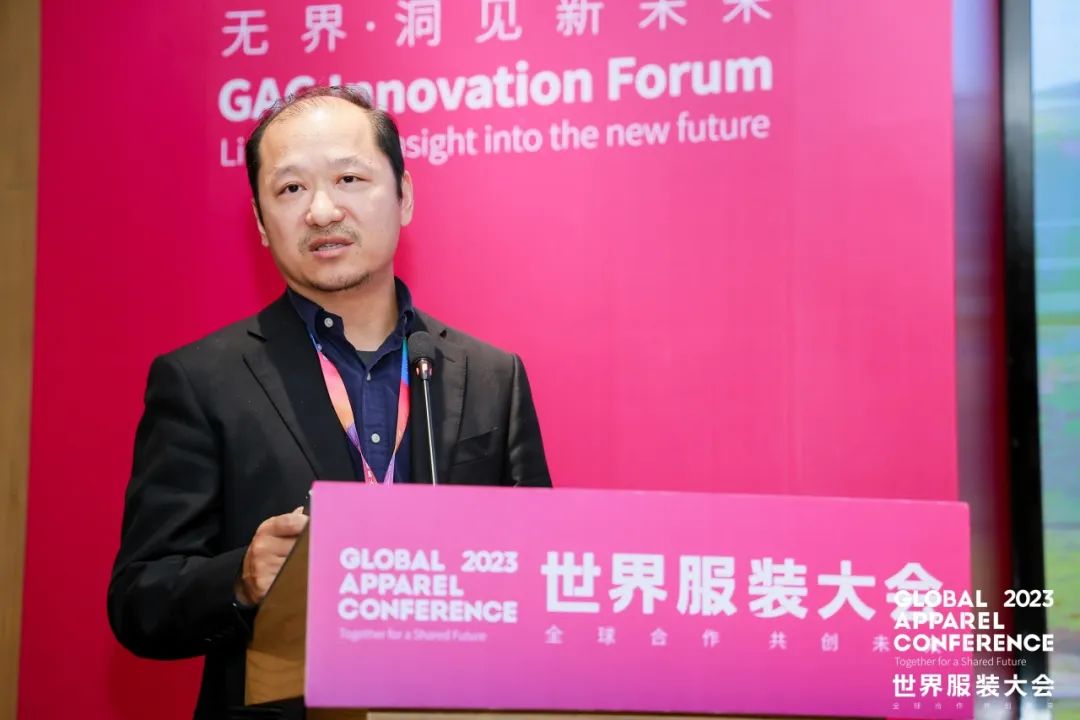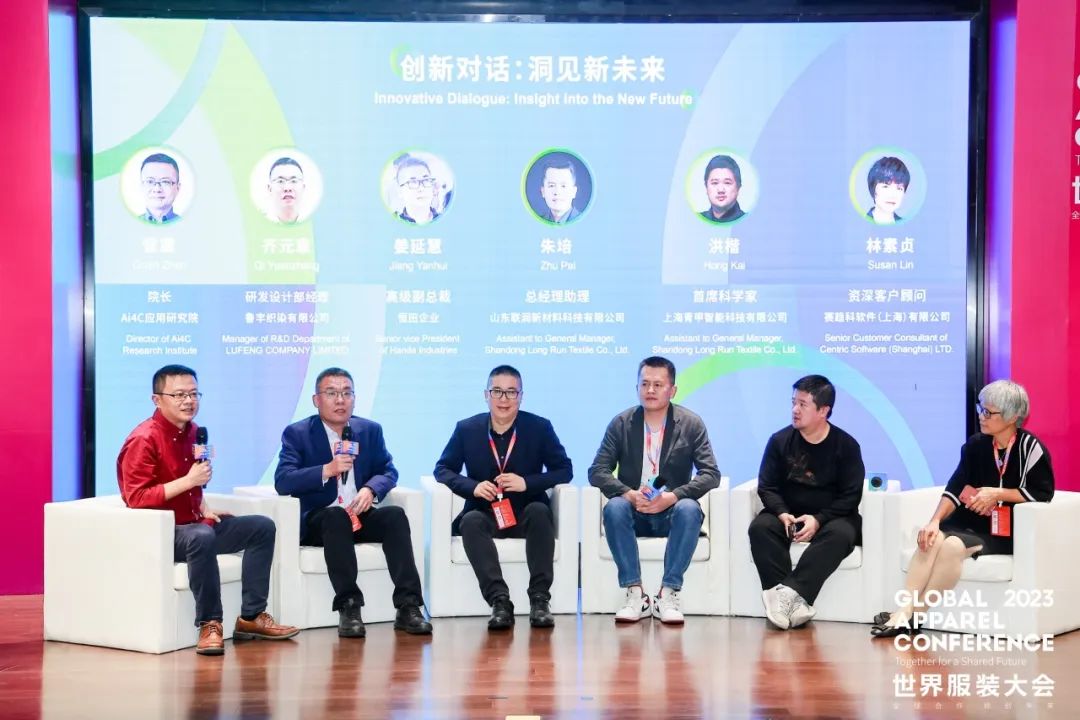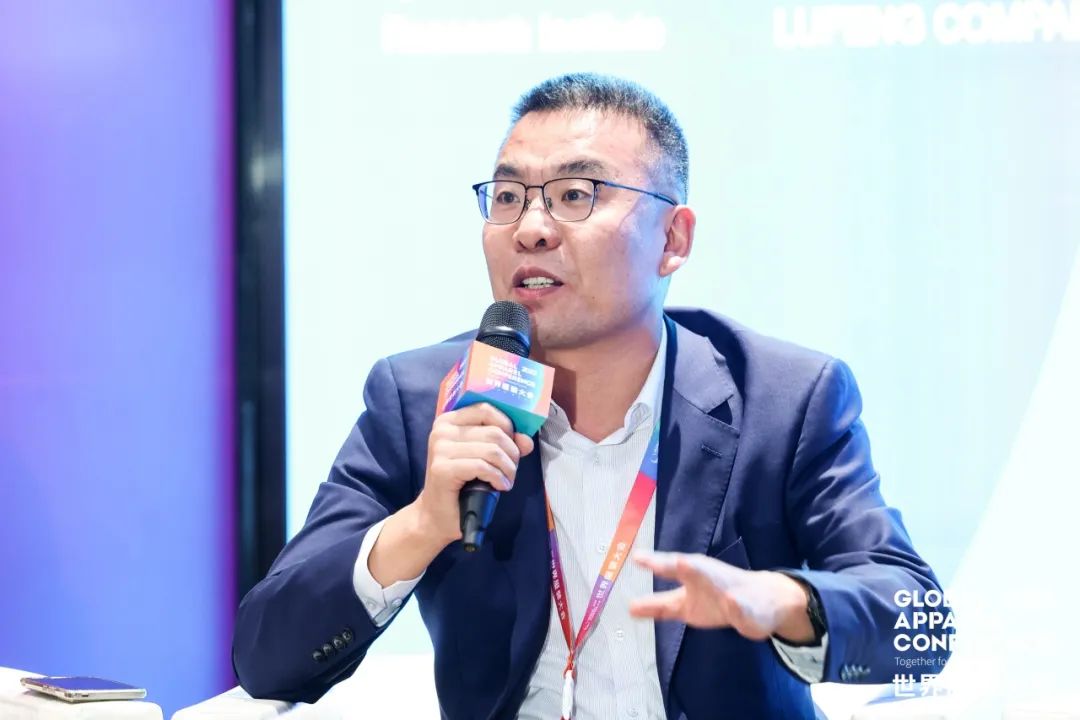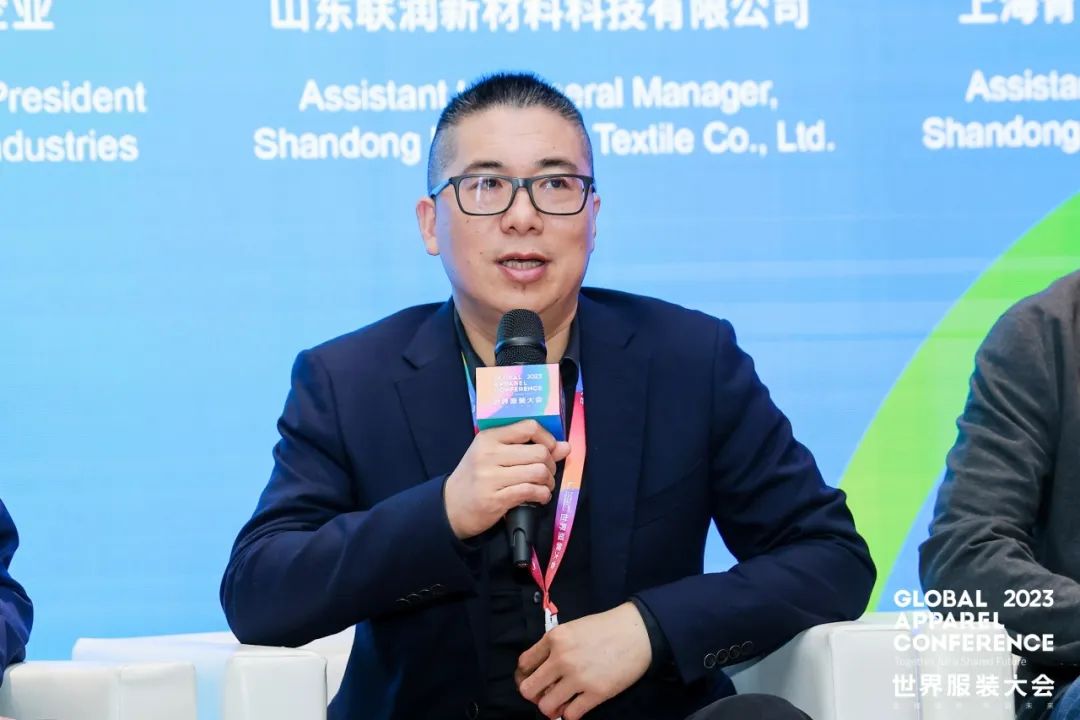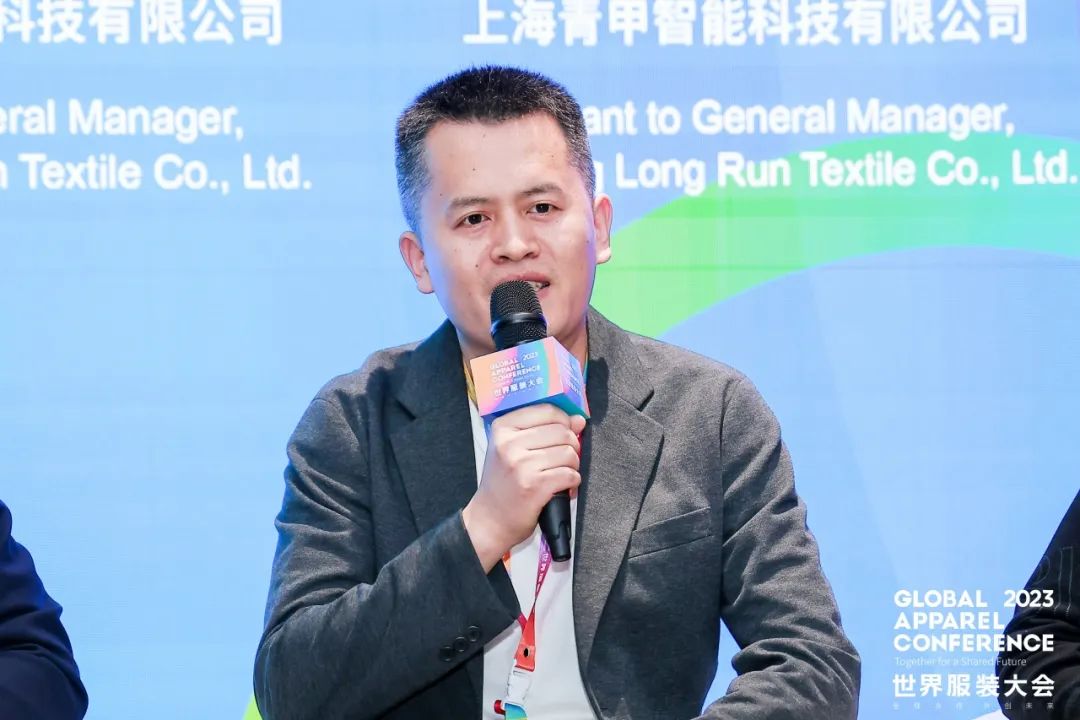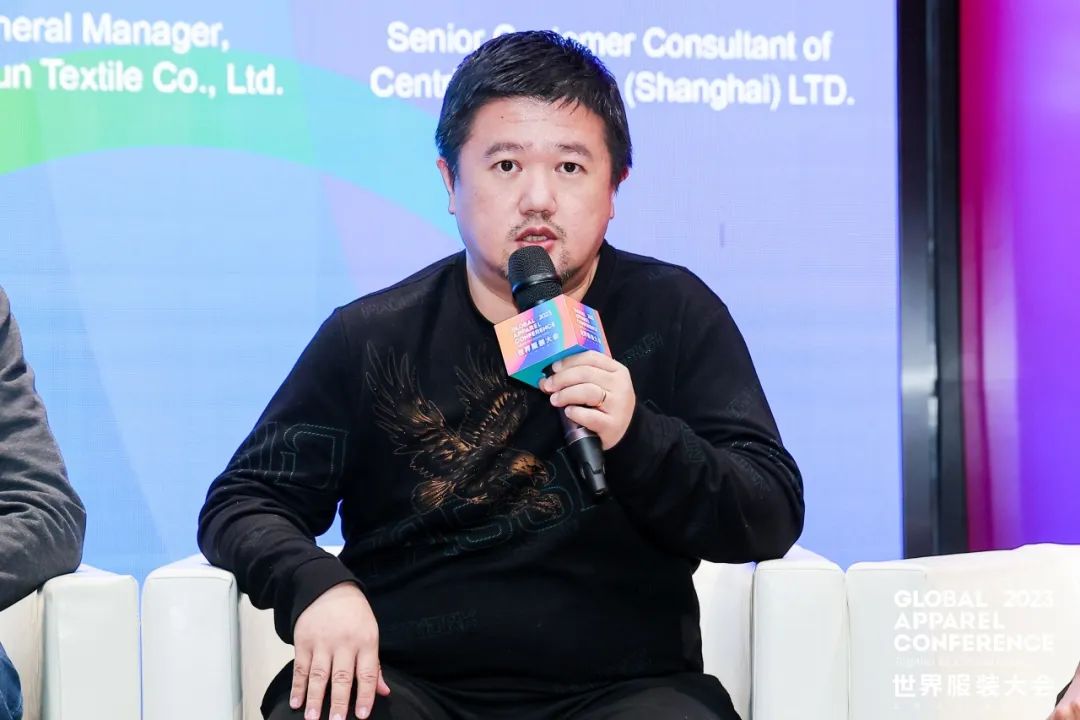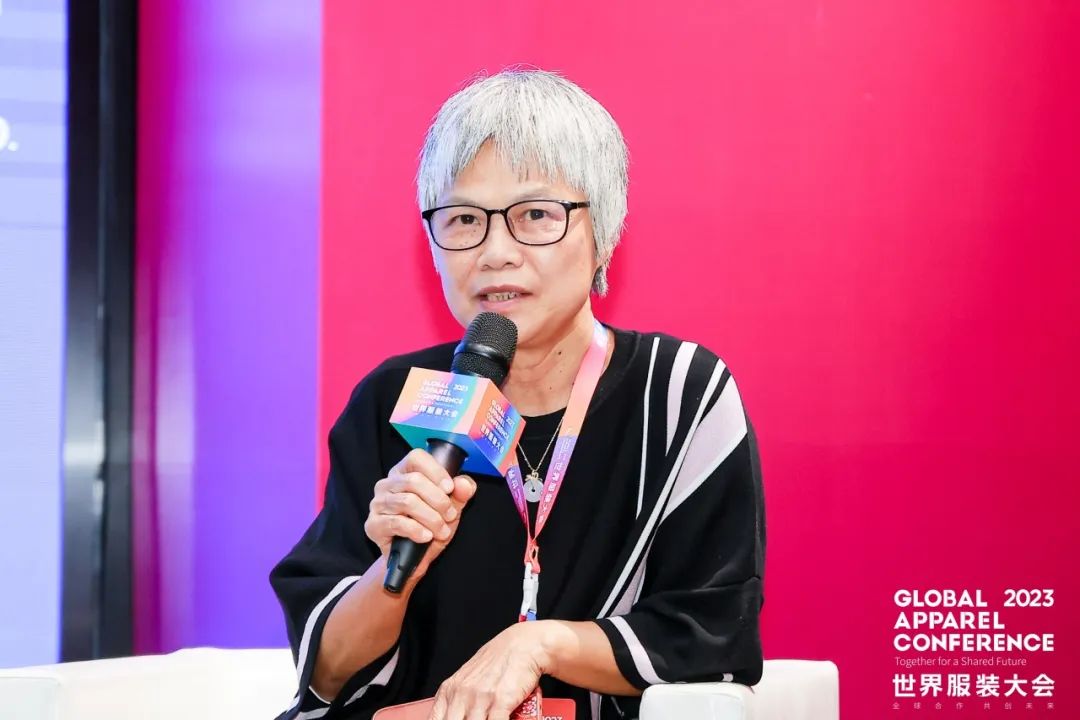Asking about digital innovation, the 2023 World Fashion Congress Technology Forum looks forward to a new future of digital and real integration
With the rapid iteration of digital technology and the increasing richness of data application scenarios, the textile and clothing industry is breaking the existing patterns and boundaries of industrial value growth through multi-dimensional digital innovation in technology, consumption, supply, and platforms.
On November 17th, a sharing and exchange focused on the deep integration of digital technology and the textile and clothing industry was held in Humen, Dongguan. Domestic and foreign experts and scholars gathered at the 2023 World Clothing Conference Technology Forum, with the theme of “Boundless · Insight into a New Future”, to deeply analyze the era background and opportunities of industrial digital development from different dimensions such as national strategy, global market, and enterprise practice. They jointly explored new trends, new concepts, new technologies, and new paths of digital intelligence empowering the upgrading of the entire industrial chain.
Sun Ruizhe, President of China Textile Industry Federation, Xu Weilin, Academician of the CAE Member, President of Wuhan Textile University, Yan Yan, Director of the Social Responsibility Office of China Textile Industry Federation and Secretary of the Party Committee of China Textile Information Center, Xie Qing, Executive Vice President of China Textile Industry Enterprise Management Association, Li Binhong, Director of the National Textile Product Development Center, Jiang Hengjie, Consultant of China Garment Association, Li Ruiping, Vice President of China Printing and Dyeing Industry Association, Leaders including Fang Leyu, a fourth level researcher from the Guangdong Provincial Department of Industry and Information Technology, Wu Qingqiu, Deputy Secretary and Mayor of the Humen Town Party Committee, Liang Xiaohui, a member of the Humen Town Party Committee, Liu Yueping, Executive Chairman of the Guangdong Provincial Clothing and Apparel Industry Association, and Wang Baomin, the head of the Humen Town Clothing and Apparel Industry Management Leading Group Office, attended the meeting. The forum is hosted by Chen Baojian, Chief Engineer of the National Textile Product Development Center.
Digital service platforms promote industrial integration and innovation
As one of the important bases of China’s textile and clothing industry, Dongguan Humen has a long industrial history and a complete industrial chain layout. In recent years, Humen has accelerated the pace of empowering high-quality development of the industry with digital technology, and a number of textile and clothing digital transformation demonstration projects have emerged.
In order to further promote the deep evolution of digital transformation from enterprises to industries to clusters, China Textile Information Center and the People’s Government of Humen Town have reached a strategic cooperation around the joint establishment of the “Humen Clothing Industry Digital Innovation Public Service Platform”, and a signing ceremony was held at the forum. Yan Yan Yan and Wu Qingqiu jointly signed a strategic cooperation agreement.
The digital innovation public service platform, as the hub of enterprise digital services for aggregating data, integrating technology, and empowering applications, will provide convenient channels for local enterprises and practitioners in Humen with digital technology, digital products, digital solutions, knowledge sharing, cooperation and exchange, and training and learning. It will improve the product innovation, technological competitiveness, and market adaptability of enterprises, and focus on promoting cross-border integration and innovation of digital technology and the clothing industry, Promote the digital transformation of textile and clothing enterprises, and promote the construction of Humen as a leading area for digital economy in the clothing industry.
Jointly building laboratories to promote the transformation of digital achievements
The Key Laboratory for Digital Creativity and Collaborative Design in the Textile Industry, as a key laboratory approved by the China Textile Industry Federation, has built a digital public service system for creative design of industry products with resource integration, collaborative interaction guidance, and virtual experience functions using modern information technologies such as artificial intelligence, virtual reality, and big data.
In order to implement the requirements for the construction of key laboratories of the China Textile Industry Federation and promote closer integration of digital technology and industry, the China Textile Information Center has selected a group of excellent digital technology enterprises with digital technology research and development and service capabilities, as well as textile and clothing enterprises with digital transformation foundation and innovation vitality, to jointly establish the “Fashion Industry Digital Technology Innovation Joint Laboratory”.
At this forum, the first batch of digital technology innovation joint laboratories in the fashion industry were officially launched. Representatives from eight enterprises, including Jiangsu Lianfa, Shandong Lianrun, Lufeng Weaving and Dyeing, Shaoxing Zhenyong, Jiangsu Hengtian, Qingjia Intelligent, Bugong Software, and Zhejiang Jinsheng, attended the launch ceremony. Sun Ruizhe, Yan Yan Yan, and Li Binhong awarded licenses to the enterprises.
In the future, the joint laboratory will carry out research on digital technology applications such as artificial intelligence, big data, cloud computing, virtual reality, and augmented reality in the actual application scenarios of textile and clothing enterprises, improve the collaborative research and development system of digital technology solutions, leverage the resources and technological advantages of various industries to jointly build, construct a path for digital technology achievement transformation, and promote the innovative practice of digital technology in the industry.
Technological innovation drives brand value growth
Xu Weilin gave a keynote speech at the meeting on “The Power of Science and Technology in Building Textile and Clothing Brands”. He pointed out that technological innovation in the textile industry should face the forefront of world technology, the main battlefield of the economy, major national needs, and people’s lives and health. Among them, the four core development directions are intelligent fibers and products, high-value functional fibers, high-performance materials and composite materials, as well as biomedical fibers and intelligent textiles. He emphasized that the textile materials industry is an important component of the country’s strategic emerging industries and plays an important supporting role in achieving innovation driven development in China.
Promoting the transformation from Made in China to Created in China, and the transformation of Chinese products to Chinese brands, brand influence determines a country’s position in the global industrial value chain. Based on a large number of case studies, Xu Weilin proposed the commonalities of clothing brand technology innovation, namely green environmental protection, functional intelligence, fashion and aesthetics, and medical health. He stated that fiber innovation and performance improvement are the foundation for promoting brand building; Technological innovation and functional integration are important levers for promoting brand building; Standard innovation and traction are key forces in promoting brand building.
Leading the development of digital fashion with cutting-edge solutions
In the sharing of “European Digital Fashion Consumption Trends”, Giulio Finzi, CEO of the Italian Digital Business Federation, combined detailed data and rich cases to introduce the situation of e-commerce in Europe, pointing out that brands have achieved effective online sales through different channels such as traditional e-commerce platforms, emerging e-commerce platforms, live streaming platforms, large social platforms, and fashion bloggers. He predicts that global fashion online sales will continue to grow at an annual rate of 11% in the coming years, with more diverse e-commerce models in Europe and clearer consumer shopping processes. Brands should pay special attention to the full channel expansion of cross-border e-commerce.
Color plays an important role in the fashion industry and often affects consumers’ purchasing decisions. “In a speech on” Global Textile and Clothing Color Supply Chain Management, “Detlev Pross, Chief Strategy Officer of Coloro headquarters, explained the new requirements for color development, color application, and color workflow in the changing environment of the global textile and clothing industry. He expressed the hope that the industry can change traditional thinking methods in color and strengthen the cultivation of color talents. One is to communicate the colors of different materials with unified standards, and the other is to implement a digital ecosystem, such as each color in the blockchain having its own ID, in order to promote the application of colors.
Yang Xiaogang, CTO of Taotian Group’s Rhino Smart Manufacturing, shared the topic of “Digital Solutions for Rhino Smart Manufacturing Clothing Industry” in conjunction with enterprise practice. As the first lighthouse factory in the global clothing industry, Rhino Smart Manufacturing is committed to becoming the world’s largest digital flexible manufacturing infrastructure. He stated that under the new trend, the fashion industry will focus on consumers and develop towards AI driven product upgrading and on-demand manufacturing. Faced with the four common pain points of demand ambiguity, process flexibility, product non-standard, and collaborative fragmentation, the fashion industry needs to create a new supply side space, drive demand mining and response with data, and rely on new technologies such as artificial intelligence to push the industry into the era of intelligence.
Integrating data and reality to enhance enterprise competitiveness
In the innovation dialogue segment, Guan Zhen, the director of Ai4C Application Research Institute, held a multi-dimensional discussion with corporate guests from the fields of materials, dyeing and finishing, fabrics, and digital technology, with the theme of “Insight into a New Future”, focusing on topics such as industrial digitization trends, intelligent technology applications, and industrial chain collaboration.
Lufeng Weaving and Dyeing utilizes artificial intelligence technology to achieve on-demand customization and maintain a high degree of product quality stability. “Qi Yuanzhang, Manager of R&D and Design Department of Lufeng Weaving and Dyeing Co., Ltd., stated that artificial intelligence technology greatly improves the efficiency of enterprise design, development, and production, enhancing the innovative design ability and position of the enterprise in the industrial chain. High tech empowering products enable enterprises to frequently highlight themselves in market competition.
Jiang Yanhui, Senior Vice President of Hengtian Enterprise, shared the innovative practices of the company in embracing new technologies in recent years. For example, transitioning from a single fabric display to better presenting products to customers through QR codes, and building enterprise data platforms that connect various links such as production and procurement, continuously accumulating and forming digital assets for the enterprise, empowering business development and efficient management, ultimately achieving interconnectivity in enterprise operations and enhancing competitiveness through optimization of efficiency.
Zhu Pei, Assistant General Manager of Shandong Lianrun New Materials Technology Co., Ltd., introduced that Lianrun and China Textile Information Center have conducted multi-dimensional cooperation, including digital analysis and the establishment of joint laboratories. From the perspective of value chain innovation, they support digital transformation, empower enterprise product research and development, and provide more accurate services to downstream customers. He believes that the future will eventually enter the era of “digital collaboration” where the upstream and downstream digital chains of the industrial chain are connected.
Qingjia is committed to developing cutting-edge virtual reality business technology, creating a one-stop comprehensive intelligent platform that connects the design end and the factory end, and introducing endless fabric development creativity to the market. “Hong Kai, Chief Scientist of Shanghai Qingjia Intelligent Technology Co., Ltd., introduced the virtual weaving machine system independently developed by Qingjia, which uses artificial intelligence calculations to initiate infinite weaving structure design, efficiently and accurately displaying the visual effects of new fabrics, At the same time, it can cooperate with technical process validation to achieve rapid mass production.
Lin Suzhen, a senior customer consultant at Sai Tu Ke Software (Shanghai) Co., Ltd., introduced specific cases of the company’s nine years of entering the Chinese market to help clothing customers accelerate their digital strategic transformation. By providing digital solutions such as PLM, Planning, and Pricing, Saitaco helps optimize product planning, pricing, design, development, procurement, and production processes, and improves operational efficiency through systematic and refined management.
With the continuous integration of digital key technologies such as 5G, artificial intelligence, industrial internet, and big data into the industry, there is a possibility of breaking through the pain points within enterprises, supply chains, and value chains. This forum not only explores new trends in industrial digital transformation, but also explores the feasibility of digital technology applications in material innovation, product development, brand building, supply chain management, and other aspects, contributing to the high-quality development of the textile and clothing industry.
Post time: Nov-21-2023


